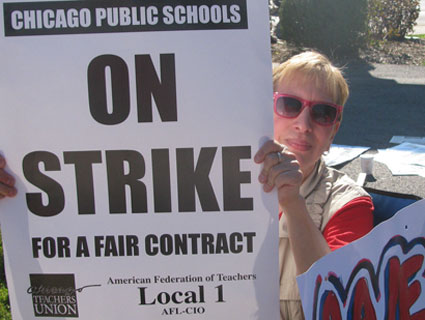
<a href="http://www.flickr.com/photos/peoplesworld/7971923484/sizes/l/">peoplesworld</a>/Flickr
This explainer has been regularly updated; click here for the most recent post. Or read on for a primer.
More than 350,000 kids in the Chicago Public School district got to sleep in an extra week because their teachers were up early striking for better benefits, job security, evaluations, and training. The Chicago Teachers Union has been in contract negotiations with Chicago Public Schools since November 2011, but this was the first actual teachers’ strike to hit the Windy City in 25 years. There have been other teacher strikes this year in Oregon and Pennsylvania, but this latest movement sparked a fierce debate about national education reform, raising questions about America’s emphasis on standardized testing. It also pit public schools against charter schools, which are often nonunionized and “tend to favor rookie teachers who are younger and far less likely to be minorities,” according to the Chicago Tribune.
Stephanie Gadlin, a spokesperson for the Chicago Teachers Union, said “we are fighting for educational justice. We do not intend on taking this anymore.” But Chicago Mayor Rahm Emanuel characterized the protest as “a strike of choice” because, he claimed, the city has already made an offer that is close to the demands of the union.
Union delegates voted to end the strike on September 18, and students returned to school on Wednesday, September 19.
Read on for the rest of our primer, or jump to these recent updates:
Teachers to get annual raises; still evaluated by standardized test scores (9/19/12)
Strike ends with compromise for both parties (9/18/12)
Strike to continue, Emanuel promises to sue (9/16/12)
Union tells CNN “tentative” deal reached, but details not released (9/14/12)
Chicago Teachers Union president says no classes on Friday (9/13/12)
Two Chicago teachers on the front lines tell Mother Jones about their experiences (9/12/12)
“Testy” negotiations resume on Wednesday (9/12/12)
Striker accuses Mayor Emanuel of liking the band, Nickelback (9/11/12)
No contract deal Tuesday night, says Chicago school board president (9/11/12)
Why are the teachers striking? The Chicago Teachers Union is looking for a contract that includes the following (information courtesy of Gadlin):
- Pay Fairness: “CTU seeks a fairer distribution of pay [i.e. higher compensation for teachers] and to preserve the schedule for career advancement established 45 years ago in the Union’s first labor contract.”
- Protection of Benefits: “Maintain our existing benefits and sick days without increasing the contribution rate [how much teachers have to pay out-of-pocket for health care].”
- Fair Evaluation Procedure: “The Chicago Public Schools’ proposed evaluation procedures could result in 6,000 teachers, or nearly a third of all CPS teachers, facing discharge within one or two years. It places too much emphasis on standardized test scores, which diminishes children’s education and punishes teachers unfairly.” In other words, teacher performance will be judged by standardized test scores.
- Teacher Training: “Chicago Public Schools is imposing a new curriculum at all schools and a strict evaluation system. Teachers have asked for more training, but CPS proposes no increase, or in some cases decreased, teacher training.”
- Timetable for air conditioning: “Teachers insist that Chicago Public Schools agree to a reasonable timetable to install air conditioning in student classrooms. In July and August, students sit in sweltering 98-degree heat.” (In case you’re wondering what students are doing in a classroom during the summer, Chicago has implemented some year-round public schools.)
The union is also looking for a fair recall procedure for laid off teachers and fair compensation for a longer school year.
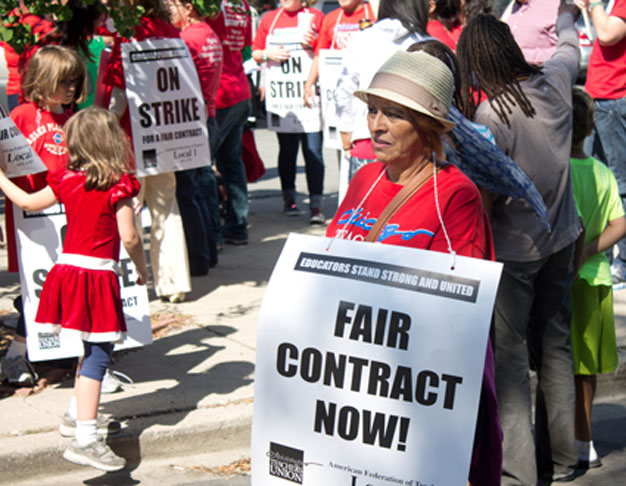 Chicago teachers on strike: September 10 br5ad, Flick
Chicago teachers on strike: September 10 br5ad, Flick
Where are teachers clashing with the school system? On Sunday, Chicago Public Schools offered the teachers union its “fair and reasonable deal,” which the union did not accept. This proposal included a 16 percent average salary increase equaling $320 million over the next four years, security for laid off teachers, and paid maternity leave, among other things. There are multiple clashes between the teachers’ asks and what the school system will give, but contrary to popular belief, it’s not all about wages (according to CNN, public school teachers are “close to a deal on pay”). Instead, the big sticking points are maintaining existing health benefits (the school district would keep costs from rising for two-thirds of union members, but the union doesn’t want anyone to be paying more) and fair evaluation procedures.
How long will the strike last? No one is hazarding a guess: Emanuel told Time he will “work to end the strike quickly.” CTU spokesperson Gadlin says that “we are currently in negotations as we speak,” but “I don’t know, I don’t have a crystal ball.”
What does Mayor Emanuel have to say about it? Emanuel says: “This is a strike of choice, and because of how close we are, it is a strike that is unnecessary. I have told my team, they are available tonight and ready to go back in. We’ve asked [the teachers] to postpone this…the issues are not financial.” To see his full statement, check out this video (by the Associated Press):
Where are the children going to go? Chicago Public Schools opened 144 “Children First” sites on Monday, September 10, with limited hours. These sites promise provide a safe environment, food, and things for kids to do. The school system is also working with libraries, nonprofits, and churches.
These organizations are providing additional sites for students. The downside is that many keep weird hours for parents. If you’re in the 60639 area code for example, it could be tough trying to shuttle a kid from the Mark Twain Elementary School Park (open 8:30 a.m. to 12 p.m.) to the New Dimension Library (open till 2 p.m.) to the Salvation Army, Midway Citadel (open till 5 p.m., but in a different zip code).
What do the parents say? Needless to say, some parents are very upset, and have taken to Twitter over the past week to express their frustration:
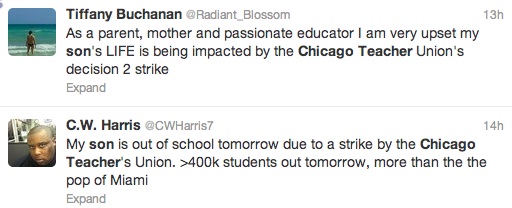

However, other parents are taking the opportunity to express their support for the teachers. As of Monday, a petition on SignOn.org has over 1,500 signatures, many from Chicago (although it’s unclear how many of the signatories are actually parents.) Here’s what Twitter has to say:
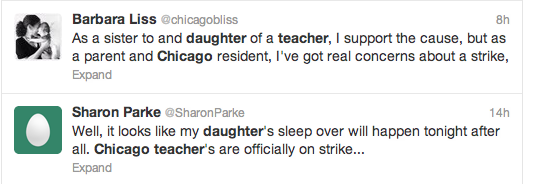
What do Mitt Romney and President Obama say? Obama hasn’t taken a firm stand on the strike one way or the other. However, at a White House press briefing on Monday, spokesman Jay Carney said that the president’s “principle concern is for the students and families who are affected by the situation. And we hope that both sides are able to come together and settle this quickly and in the best interest of Chicago’s students.” Here’s a video of the briefing:
GOP presidential candidate Mitt Romney has taken a firm stance against the strike. He said in a press release: “I am disappointed by the decision of the Chicago Teachers Union to turn its back on not only a city negotiating in good faith but also the hundreds of thousands of children relying on the city’s public schools to provide them a safe place to receive a strong education. Teachers unions have too often made plain that their interests conflict with those of our children, and today we are seeing one of the clearest examples yet. President Obama has chosen his side in this fight, sending his Vice President last year to assure the nation’s largest teachers union that ‘you should have no doubt about my affection for you and the President’s commitment to you.’ I choose to side with the parents and students depending on public schools to give them the skills to succeed, and my plan for education reform will do exactly that.”
What do others say? New York Times columnist Nicholas Kristof is leading a social media debate on both Twitter and Facebook about his view:
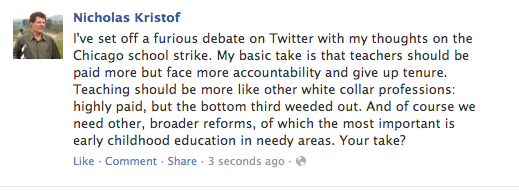 Labor expert Kathleen Hirsman told CBS News, “We are in uncharted waters in regards to this strike…in the past, strikes usually center around pay increases, and it’s just a matter of horse trading on the numbers. In this instance, the union does not seem to be focusing on salary as their main issue of contention.”
Labor expert Kathleen Hirsman told CBS News, “We are in uncharted waters in regards to this strike…in the past, strikes usually center around pay increases, and it’s just a matter of horse trading on the numbers. In this instance, the union does not seem to be focusing on salary as their main issue of contention.”
Employment law expert John P. Hancock Jr. says: “The length of the strike is tough to call but if I were to make a prediction, I would say three weeks. That is one paycheck missed and probably the boiling point of the parents making child care arrangements and enough time for Emanuel to show he is tough and that the union is tough. This is strike is different because in many states such strikes are illegal…the size of it makes it different as well and the number of children involved. Also, you have a large number of competing charter schools who are not on strike…I believe some of their demands will be met because they cannot continue to have the schools shut down. I understand and can relate to them because my daughter used to be a teacher in Chicago Public Schools.”
UPDATE 8, 2:00 p.m. EDT, Wednesday, September 19: Teachers to get annual raises; still evaluated by standardized test scores
After an almost unanimous vote by delegates of the Chicago Teachers Union, 350,000 Chicago students returned to school today. According to The New York Times, the compromise gives annual raises to teachers and moves “laid-off teachers with strong ratings into at least half of any new job openings in schools.” However, Mayor Emanuel appears to have gotten his way in regards to the teacher evaluation issue: Teachers will still be partly evaluated on standardized test scores.
The contract still needs to be ratified by Chicago Teacher Union members, which is expected to happen in the next few weeks. A full copy of the contract deal has not yet been made public.
UPDATE 7, 6:45 p.m. EDT, Tuesday, September 18: Chicago Teachers Union Delegates Vote to End Strike
Reuters reports: “Some 800 delegates representing the union rank-and-file ended the strike after more than two hours of debate on a new three-year contract with the school district. The compromise deal gave Emanuel part of the reforms he wanted, and teachers got some guarantees on employment.”
UPDATE 7, 9:30 p.m. EDT, Sunday, September 16: Strike continues, Emanuel promises to sue
The Chicago Tribune reports that the teacher strike will be heading into its second week, and Mayor Emanuel is planning to file a court injunction. According to the paper, classes may not resume until Wednesday.
UPDATE 6, 7:00 p.m. EDT, Friday, September 14: Union tells CNN tentative deal reached, but details not released
According to CNN, “a tentative deal has been reached in the dispute.” However, language of the agreement will be drafted over the weekend, and at this time there are no further details about what the agreement contains.
UPDATE 5, 4:30 p.m. EDT, Thursday, September 13: Chicago Teachers Union President says no classes on Friday
Chicago Teachers Union President Karen Lewis tells The Chicago Tribune that classes will not resume Friday, but “I’m a 9 [on a deal being reached today.]”
UPDATE 4, 8:30 p.m. EDT, Wednesday, September 12: Two Chicago teachers on the front lines tell Mother Jones about their experiences
[Both teachers requested to remain anonymous.]
Teacher 1: “I have worked as an educator in the Chicago Public Schools (CPS) for four years and in the education field for six. I work on the Northwest side of the city in one of the highest performing CPS networks….We have Starboards and iPads and the ability to access and ask for supplies at any point in the year. We are a very successful neighborhood school. So why have I been wearing a sandwich board-like picket sign and red garb for the past three days? Why have I attended five pickets and rallies at my school, one of the chosen Children First locations, a high school, and in downtown Chicago? I have come home with aching feet without getting paid because I have seen schools and students that have far less than my students and me. I have seen a parent being removed from those schools in handcuffs after entering the school and assaulting a first grader. I have seen five-year-old students at those schools being lectured by a principal about how to deal with the gang activity in their neighborhood. I am on strike because, like one rally sign stated, ‘Together we bargain – alone we beg.’
There is a sense of safety being with that many people fighting with you. Perhaps the crowd provides a sense of freedom to be more creative with signs, music, and chants. Being with the larger group makes the sting of angry drivers stopping by to scream, “You are a fucking piece of shit!” at our picket line subside. I do not believe this event to be detrimental to students; they will make up the days once the strike ceases. I understand the inconvenience on the families and believe it to be unfortunate, but we must understand that the fight is a larger, national, even worldwide situation.”
Teacher 2: “I am a special education pre-school teacher. I have been a teacher at CPS for a year. I was an assistant teacher in CPS for a year as well. I have picketed at my school and one of the 144 holding centers that are open. I went to rallies downtown yesterday and Monday. Today we rallied at a high school in Chicago. The mood while picketing at our local school is a bit frustrating for me. Most of the teachers’ attitudes are not really enthusiastic. We just walk around and don’t chant. Downtown feels completely different. When I am at the rally downtown I feel like I am part of a family of people who are positive and determined to get better conditions for our students.
I am protesting for my students. I am striking because I don’t want any child to be in a classroom with 40 other children and one adult. I want enough school nurses, social workers, speech pathologists, and occupational therapists to service my students. I want children to have art, music, and physical education. I want children to be taught foreign languages and to get to go to school building that are not falling apart, and are safe. I want all children in public schools to have adequate resources to be able to succeed in school. I want to be evaluated in a fair way, not primarily by tests scores. I am protesting because teachers have not been included in school reform talks, and sadly the only way to get our voices heard has been to strike. In the long run it will hurt our students more to give up this fight.”
UPDATE 3, 3:30 p.m. EDT, Wednesday, September 12: “Testy” negotiations resume Wednesday
The Chicago Tribune reports that negotiations have resumed, but characterizes a top Chicago Public Schools official as starting them on a “testy” note. According to the paper, Barbara Byrd-Bennett, the district’s chief education advisor is “laying the blame for no agreement on union leaders.”
UPDATE 2, 7:00 p.m. EDT, Tuesday, September 11: No contract deal Tuesday night, says Chicago school board president
Chicago School Board President David Vitale tells CNN there will be no contract deal Monday night. He also says that he told the union: “we should resolve this tomorrow. We are close enough.”
UPDATE 1, 4:00 p.m. EDT, Tuesday, September 11: Striker accuses Mayor Emanuel of liking the band Nickelback
Gawker published this gem of a sign at a teachers’ protest today:














